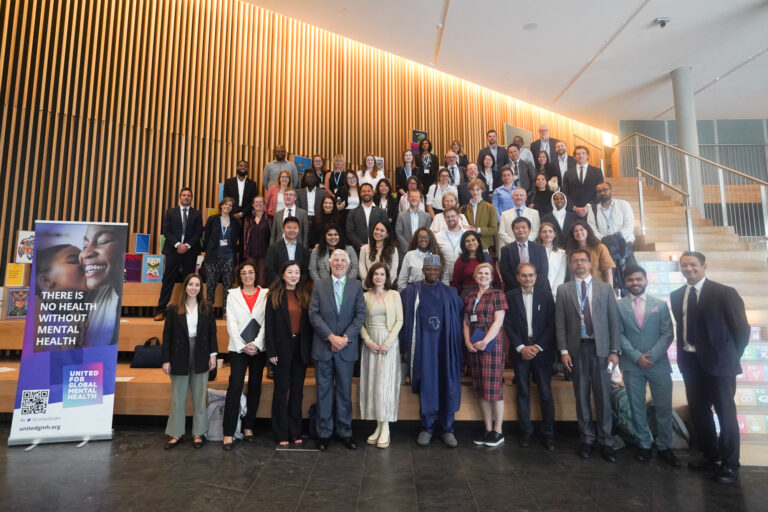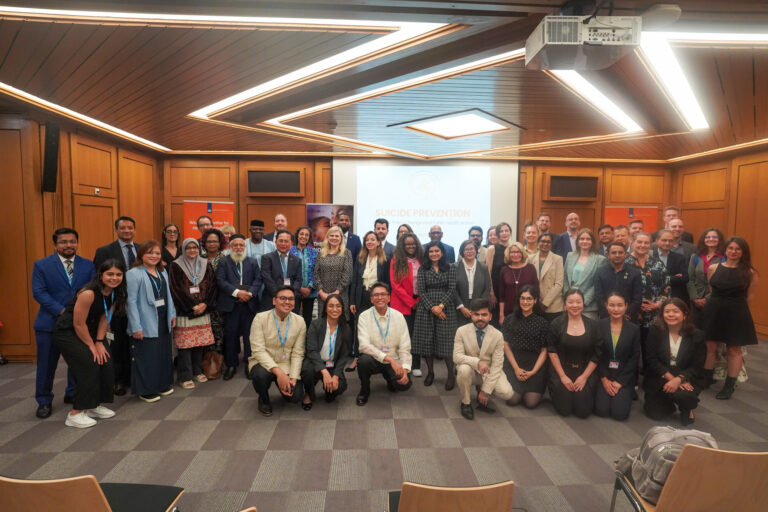United for Global Mental Health and the 78th World Health Assembly
By Sarah Kline, CEO of United for Global Mental Health
What a week! The World Health Assembly (WHA) gathers health ministers and the health community from around the world. Mental health is firmly on the global and national agenda, and we have left Geneva feeling optimistic and energised.

(Photo: Attendees and speakers at our side‐event, “Mental Health & Human Rights: Towards Community-Based Care.”)
Mental health had the highest profile at a WHA that we’ve ever seen, and for all the right reasons:
Numerous governments committed to act
Over 40 countries organised or participated in mental health events and/or met with mental health advocates and voiced their commitments to do more and do better on mental health. This is unprecedented. Mental health now has a separate agenda item at WHA, so we can look forward to a report each year detailing progress and recommending actions for member states. A resolution was passed on social connection with a strong set of recommendations for member states on mental health-related topics.
Not just about foreign aid
While many in the global health community debated on future funding and the shape of the global health architecture, national governments talked about mental health in terms of domestic investment, local capacity, and local solutions. Make no mistake, foreign aid matters, particularly for humanitarian MHPSS work and for integrated mental health support e.g. HIV and TB programmes, but the optimism that domestic solutions can be found and will be the driver of change was palpable.
Necessary to hear from lived experience
UnitedGMH is very proud to be the secretariat of the Global Mental Health Action Network. We brought mental health advocates from a range of countries to share what is happening in mental health and to ensure governments heard from people with lived experience. For the first time, most countries openly acknowledged that lived experience is critically important to shaping mental health policies and practice.
Nothing is off the table
Ministers discussed action on suicide prevention, deinstitutionalisation and community-based care. These are tough topics, traditionally heavily stigmatised, but ministers openly discussed the problems and the solutions. An event on the social and commercial determinants of mental health saw the audience crammed in, keen to engage. And robust, timely discussions on the positive and negative impacts of technology and mental health continued all week.
No longer a niche
Mental health was discussed at events on climate change, Universal Health Coverage, physical health and exercise, gender, and many more. It was finally acknowledged that most people consider their physical and mental health equally important, and there are strong links between mental health and sectors beyond health.
Now we look at the UN High-Level Meeting
The energy and desire for action were clear, which bodes well for the UN HLM on NCDs and Mental Health. The number of governments and organisations advocating for an ambitious political declaration was deeply encouraging. The zero draft of the declaration is already circulating, and the next draft is due in the coming weeks. Now is the time to advocate for an ambitious global commitment to mental health.

(Photo: speakers and attendees at our side-event on Suicide Prevention)
Learn more about some of the events we co-hosted with partners and global advocates from the Global Mental Health Action Network (each link opens up a short video):
- Suicide prevention involving Bangladesh, Cambodia, Guyana, India, and WHO
- Community-based mental health care involving Mexico, Portugal, India, OHCHR and WHO
- Child and Youth mental health involving the Being partnership, South Africa, UNICEF and WHO
- Social and Commercial Determinants of Mental Health involving WHO, World Federation of Public Health Associations, Movendi and the World Obesity Federation
We also attended or spoke at events focused on:
- Non-Communicable Diseases and the promotion of mental health and wellbeing
- Physical health and mental health involving WFSGI, the International Olympic Committee, Nigeria, Nike, WEF and many more
- Environment and climate change involving KPMG, and CSOs from Barbados and Kenya